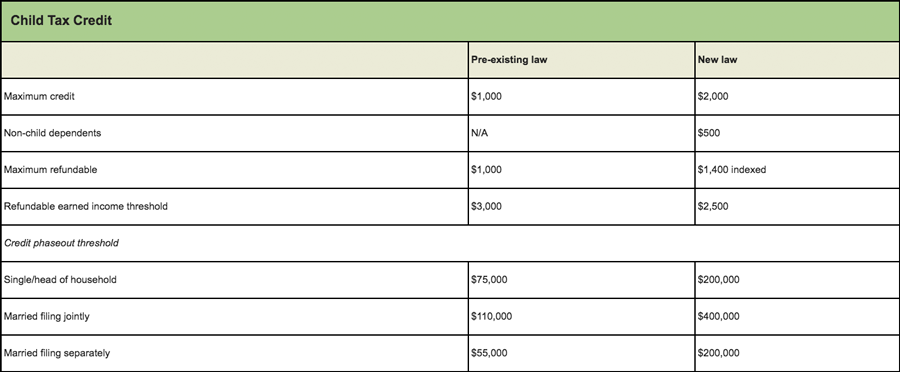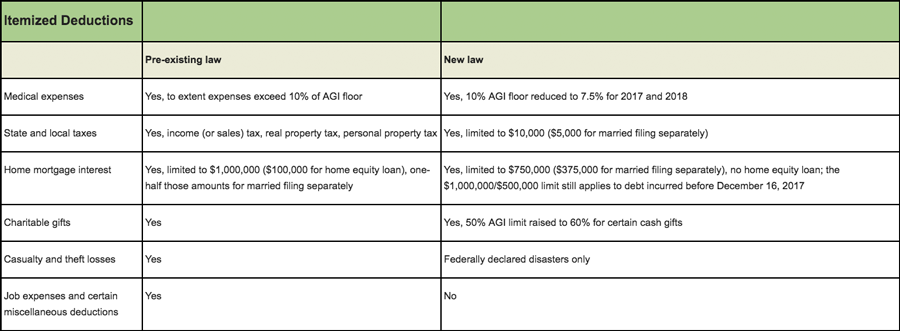
The 2017 Tax Cuts & Jobs Act
The Tax Cuts and Jobs Act legislation has been passed by Congress and today, was signed by the President. The Act makes extensive changes that will affect both individuals and businesses. Some of the key provisions of the Act are discussed below. Most of these provisions will be effective for 2018. Many individual tax provisions will then sunset and revert to the pre-existing law after 2025; the corporate tax rates provision is made permanent. Comparisons below are generally for 2018.
Individual Income Tax Rates
Pre-existing law. There were seven regular income tax brackets: 10%, 15%, 25%, 28%, 33%, 35%, and 39.6%.
New law. There are seven tax brackets: 10%, 12%, 22%, 24%, 32%, 35%, and 37%. These provisions sunset and revert to pre-existing law after 2025.
Standard Deduction, Itemized Deductions, and Personal Exemptions
Pre-existing law: In general, personal (and dependency) exemptions were available for you, your spouse, and your dependents. Personal exemptions were phased out for those with higher adjusted gross incomes.
You could generally choose to take the standard deduction or to itemize deductions. Additional standard deduction amounts were available if you were blind or age 65 or older.
Itemized deductions included deductions for: medical expenses, state and local taxes, home mortgage interest, investment interest, charitable gifts, casualty and theft losses, job expenses and certain miscellaneous deductions, and other miscellaneous deductions. There was an overall limitation on itemized deductions based on the amount of your adjusted gross income.
New law: The standard deduction is significantly increased, and the additional standard deduction amounts for those over age 65 or blind are still available. The personal and dependency exemptions are no longer available.
Many itemized deductions are eliminated or restricted. The overall limitation on itemized deductions based on the amount of your adjusted gross income is eliminated.
- The 10% of AGI floor for the deduction of medical expenses is reduced to 7.5% in 2017 and 2018 (for regular tax and alternative minimum tax).
- The deduction for state and local taxes is limited to $10,000. An individual cannot prepay 2018 income taxes in 2017 in order to avoid the dollar limitation in 2018.
- The deduction for mortgage interest is still available, but the benefit is reduced for some individuals, and interest on home equity loans is no longer deductible.
- The charitable deduction is still available, but modified.
- The deduction for personal casualty losses is eliminated unless the loss is incurred in a federally declared disaster.
- These provisions sunset and revert to pre-existing law after 2025.
Standard deduction, itemized deductions, and personal exemptions


Child tax Credit
Pre-existing law. The maximum child tax credit was $1,000. The child tax credit was phased out if modified adjusted gross income exceeded certain amounts. If the credit exceeded the tax liability, the child tax credit was refundable up to 15% of the amount of earned income in excess of $3,000 (the earned income threshold).
New law. The maximum child tax credit is increased to $2,000. A nonrefundable credit of $500 is available for qualifying dependents other than qualifying children. The maximum refundable amount of the credit is $1,400, indexed for inflation. The amount at which the credit begins to phase out is increased, and the earned income threshold is lowered to $2,500. The changes to the credit sunset and revert to pre-existing law after 2025.

Alternative minimum Tax (AMT)
Under the Act, the alternative minimum tax exemptions and exemption phaseout thresholds are increased. The AMT changes sunset and revert to pre-existing law after 2025.
Kiddie Tax
Instead of taxing most unearned income of children at their parents’ tax rates (as under pre-existing law), the Act taxes children’s unearned income using the trust and estate income tax brackets. This provision sunsets and reverts to pre-existing law after 2025.
Corporate tax rates
Under the Act, corporate income is taxed at a 21% rate. The corporate alternative minimum tax is repealed.
Special provisions for business income of individuals
Under the Act, an individual taxpayer can deduct 20% of domestic qualified business income (excludes compensation) from a partnership, S corporation, or sole proprietorship. The benefit of the deduction is phased out for specified service businesses with taxable income exceeding $157,500 ($315,000 for married filing jointly). The deduction is limited to the greater of (1) 50% of the W-2 wages of the taxpayer, or (2) the sum of (a) 25% of the W-2 wages of the taxpayer, plus (b) 2.5% of the un-adjusted basis immediately after acquisition of all qualified property (certain depreciable property). This limit does not apply if taxable income does not exceed $157,500 ($315,000 for married filing jointly), and the limit is phased in for taxable income above those thresholds. This provision sunsets and reverts to pre-existing law after 2025.
Retirement plans
Under the Act, the contribution levels for retirement plans remain the same. However, the Act repeals the special rule permitting a recharacterization to unwind a Roth conversion.
Estate, gift, and generation-skipping transfer tax
The Act doubles the gift and estate tax basic exclusion amount and the generation-skipping transfer tax exemption to about $11,200,000 in 2018. This provision sunsets and reverts to pre-existing law after 2025.
Health insurance individual mandate
The Act eliminates the requirement that individuals must be covered by a health care plan that provides at least minimum essential coverage or pay a penalty tax (the individual shared responsibility payment) for failure to maintain the coverage. The provision is effective for months beginning after December 31, 2018.
Data sources: Economic: Based on data from U.S. Bureau of Labor Statistics (unemployment, inflation); U.S. Department of Commerce (GDP, corporate profits, retail sales, housing); S&P/Case-Shiller 20-City Composite Index (home prices); Institute for Supply Management (manufacturing/services). Performance: Based on data reported in WSJ Market Data Center (indexes); U.S. Treasury (Treasury yields); U.S. Energy Information Administration/Bloomberg.com Market Data (oil spot price, WTI Cushing, OK); www.goldprice.org (spot gold/silver); Oanda/FX Street (currency exchange rates). All information is based on sources deemed reliable, but no warranty or guarantee is made as to its accuracy or completeness. Neither the information nor any opinion expressed herein constitutes a solicitation for the purchase or sale of any securities, and should not be relied on as financial advice. Past performance is no guarantee of future results. All investing involves risk, including the potential loss of principal, and there can be no guarantee that any investing strategy will be successful.
The Dow Jones Industrial Average (DJIA) is a price-weighted index composed of 30 widely traded blue-chip U.S. common stocks. The S&P 500 is a market-cap weighted index composed of the common stocks of 500 leading companies in leading industries of the U.S. economy. The NASDAQ Composite Index is a market-value weighted index of all common stocks listed on the NASDAQ stock exchange. The Russell 2000 is a market-cap weighted index composed of 2,000 U.S. small-cap common stocks. The Global Dow is an equally weighted index of 150 widely traded blue-chip common stocks worldwide. Market indices listed are unmanaged and are not available for direct investment.
PREMIER WEALTH ADVISORS
NEW YORK
1411 Broadway, 16th Floor
New York, NY 10018
(800) 499-4143
LONG ISLAND
626 RXR Plaza, 6th Floor
Uniondale, NY 11856
(516) 778-5822
All content on the Premier Wealth Advisors, LLC. websites are provided for informational purposes only and are deemed to be from reliable sources. However, no warranty, expressed or implied, is made regarding its presentation.
This content should not be viewed as a recommendation, offer, or solicitation by PWA to buy, sell, or hold any security or financial product, nor does it endorse any specific investment strategy. Past performance does not guarantee future results, and all investments carry the potential for loss.
PWA manages portfolios based on each client’s specific investment needs, as specified in a signed investment advisory agreement. As a result, each client’s portfolio reflects unique circumstances and investment outcomes. PWA’s outlook and strategies may change based on updated client information, or if material or significant shifts in economic and financial market conditions occur.
While PWA aims to add value in areas beyond investments, such as tax and estate planning, we do not claim to be income tax professionals or estate planning attorneys. You should consult your tax advisor and/or estate planning attorney for legal or accounting needs.
Advisory Services are offered through Premier Wealth Advisors, LLC. an SEC Registered Investment Adviser.

